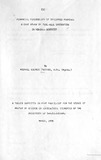| dc.contributor.author | Thiongo, Michael N | |
| dc.date.accessioned | 2016-06-17T09:30:58Z | |
| dc.date.available | 2016-06-17T09:30:58Z | |
| dc.date.issued | 1978-03 | |
| dc.identifier.uri | http://hdl.handle.net/11295/96131 | |
| dc.description.abstract | Whereas some studies have evaluated large-scale irrigation
schemes In Kenya, little economic research has been done on the Minor Irrigation projects. The decision by the Kenya Government to increase emphasis on development of Minor Irrigation
Schemes necessitates studies on these particularly from the financial and economic standpoint.
Tube-wells are part of the minor irrigation development programme in Coast Province which i3 characterized by a general shortage of big rivers and streams. This shortage of surface water in the Province in particular and generally in the republic
had been realised even during the colonial days. Government
efforts have been carried out mainly by construction of tube-wells, which progressed steadily so that oy the early 1970s over 60 tube-wells were being bored annually by the Kenya Government.
The substantial costs involved in this tube-well development
were justified by the fact that the projects were undertaken
by the Government or the Municipality for community water
development. As such boring of tube-wells was restricted to the community centres only. Unfortunately most of these tube-wells especially those in Coast Province were abandoned when no personnel was available to maintain them.
A survey cf the area between Gazi and Mtuapa in Coast Province in 1969 to study the distribution of tube-wells, their yields, and water quality rated this S3 ’-a good area of groundwater resources*. It was recommended In this report
Civ)
that some selected tube-wells which were yielding considerable
quantities of good quality water should be rehabilitated and fitted with powered pumps for the purpose of irrigation and domestic water supply* This recommendation was not implemented
because information was lacking concerning their financial viability as irrigation projects.
> This thesis is therefore concerned with evaluation and appraisal of tube-well irrigation projects in Mombasa District to establish their financial worth. Mombasa District was selected
for the 3tudy on account of the concentration of tube- wells. The focus of Vie thesis involved collection of primary data from a sample of 10 farms using each diesel and electric pumps.
Irrigated farming is capital and labour intensive. High initial investment capital is required to start-off a tube- well irrigation project. Because of the high costs involved in supplying irrigation water, only crops with high gross margins
per hectare can be grown profitably. The study revealed that tube-well irrigated farming based on high-value horticultural
crops can be a highly profitable venture if properly designed
and planned. Knowledge of the important factors affecting
returns is invaluable. A high degree of managerial ability, innovativeness and first-hand market intelligence and knowledge of irrigation techniques is indispensable for successful irrigation.
Inspite of the high investment and running costs involved in tube-wells irrigation projects, they are financially viable
(v)
and yield high rates of return to investment and internal rates of return© | en_US |
| dc.language.iso | en | en_US |
| dc.publisher | University of Nairobi | en_US |
| dc.rights | Attribution-NonCommercial-NoDerivs 3.0 United States | * |
| dc.rights.uri | http://creativecommons.org/licenses/by-nc-nd/3.0/us/ | * |
| dc.subject | Financial feasibility, farming, tube -well irrigation, Mombasa | en_US |
| dc.title | Financial feasibility of irrigated land farming: A case study of tube -well irrigation in Mombasa District | en_US |
| dc.type | Thesis | en_US |



